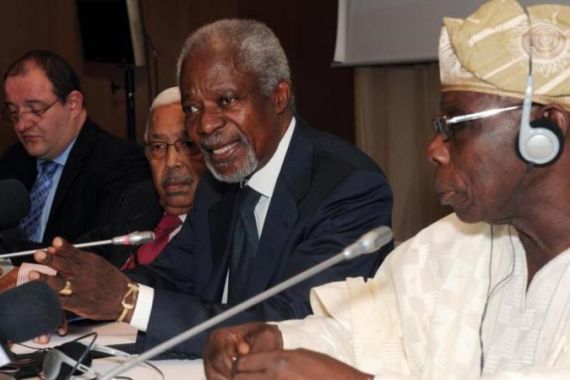West Africa ‘should decriminalise drugs’
Report by regional commission, including ex-Nigeria president, says current drug policies causing public health crisis.

A report by a panel of experts has called for minor drugs offences to be decriminalised in west Africa, saying trafficking, consumption and production is undermining development and causing a public health crisis.
The West Africa Commission on Drugs (WACD) said on Thursday that current policies were fuelling corruption in a region where the cocaine trade alone, estimated at $1.25bn a year, dwarfs the combined budgets of several countries.
“We call on west African governments to reform drug laws and policies and decriminalise low-level and non-violent drug offences,” Olusegun Obasanjo, the commission chairman and former president of Nigeria, told reporters in Dakar on Thursday.
“West Africa is no longer just a transit zone for drugs arriving from South America and ending up in Europe but has become a significant zone of consumption and production.
“The glaring absence of treatment facilities for drug users fuels the spread of disease and exposes an entire generation, users and non-users alike, to growing public health risks.”
The commission highlighted the drug-fuelled instability in Guinea-Bissau, a country of just 1.5 million people which has been wracked by conflict between the army and state since independence from Portugal in 1974.
Drug traffickers have turned the country, sandwiched between Senegal and Guinea, into a transit point for the international cocaine trade.
‘Militarisation of drug policy’
The WACD report also argued that the widespread criminalisation of drug use was bloating the prison population.
Most governments' reaction to simply criminalise drug use without thinking about prevention or access to treatment has not just led to overcrowded jails, but also worsened health and social problem
Inmates are rarely reformed and in many cases end up more criminalised or sick as a result of their time inside, said the report, entitled “Not Just in Transit – Drugs, the State and Society in West Africa.”
The study is the culmination of 18 months of research and consultations with the African Union, the Economic Community of West African States, the UN Office on Drugs and Crime, and several regional and national organisations.
The report was commissioned by Kofi Annan, the former secretary general of the UN.
Contributors included Senegalese psychiatrist Idrissa Ba, retired Sierra Leonean judge Justice Bankole-Thompson, Pedro Pires, a former president of Cape Verde.
It describes the political, social and economic challenges that the region must confront to prevent drug trafficking, production and consumption from undermining states and societies, and destroying lives.
“Most governments’ reaction to simply criminalise drug use without thinking about prevention or access to treatment has not just led to overcrowded jails, but also worsened health and social problems,” Annan said.
The authors make a draft of recommendations for states to adopt a joined-up policy for battling drug abuse which includes treating it as a public health issue rather than as a criminal justice matter, the AFP news agency reported.
Their report urges west African states to tackle corruption within governments, the security services and the judiciary that drugs cartels have been able to exploit.
It also calls for governments to avoid “militarisation of drug policy” which it says has been ineffective in Latin America.
“We caution that west Africa must not become a new front line in the failed ‘war on drugs’, which has neither reduced drug consumption nor put traffickers out of business,” the report said.